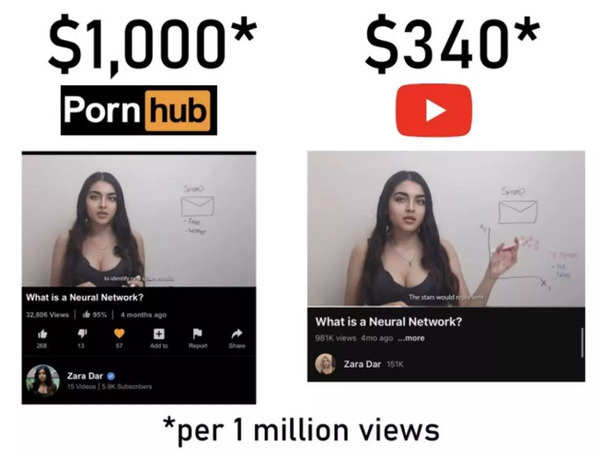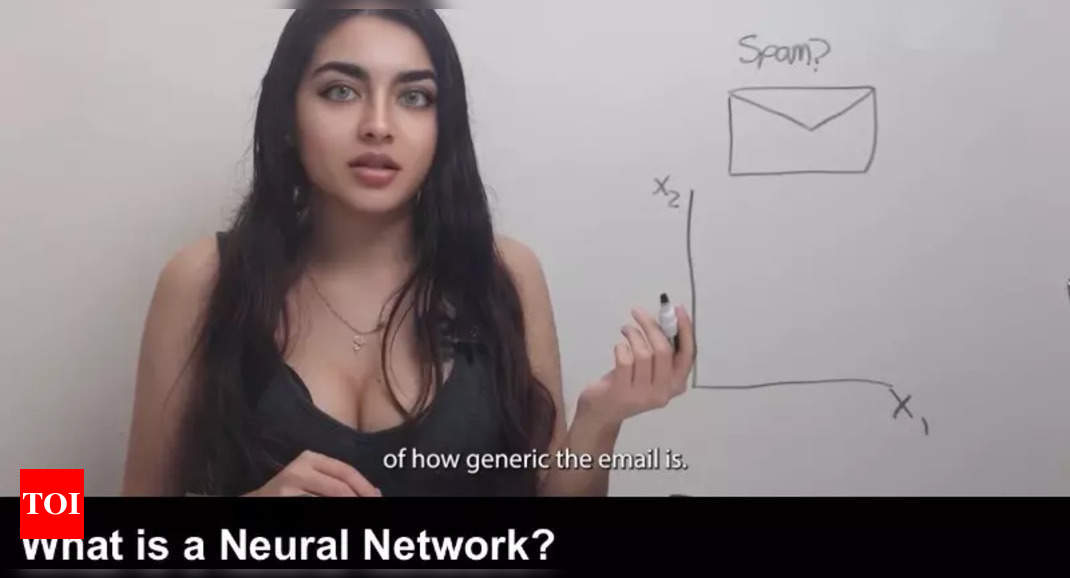Zara Dar recently took to LinkedIn to share an eye-opening post comparing the ad revenue she earns on YouTube and Pornhub for her STEM-focused videos. Her transparency garnered significant attention on the platform, with many “Top Voices” reaching out to her in support of her innovative approach. However, when Zara shared the same post on X (formerly Twitter), she faced an unexpected consequence: her account was blocked.
“I shared the same post on X and LinkedIn comparing the ad revenue I typically earn per view on YouTube versus Pornhub, where I upload my STEM videos,” Zara explained. “While the post went semi-viral on LinkedIn with many Top Voices reaching out to me, my account was unexpectedly blocked without prior notice!”
Who is Zara Dar?
Zara Dar, a former PhD student turned content creator, is reshaping the landscape of online education by uploading AI and STEM-focused lectures to unconventional platforms like Pornhub. Zara, who made waves by announcing her transition from academia to OnlyFans in December 2024, has captured attention once again with her bold approach to content distribution. Her story sheds light on the challenges and opportunities faced by creators in the rapidly evolving digital economy.
From Academia to OnlyFans: A Bold Career Shift

Zara Dar
In December 2024, Zara Dar revealed her decision to leave her PhD program to focus on OnlyFans, a platform known primarily for adult content but increasingly used by creators in various niches. Citing financial reasons and a desire to escape the rigid constraints of academia, Zara explained that OnlyFans offered her both economic stability and the freedom to pursue creative projects without institutional interference. Her decision sparked widespread discussion, with supporters applauding her pragmatism and critics questioning the move.
Diversifying Platforms: STEM Content on Pornhub
While her OnlyFans journey made headlines, Zara’s latest venture—uploading STEM content to Pornhub—has reignited the conversation about the future of digital content creation. In a LinkedIn post that later went viral, Zara disclosed that she publishes the same AI and neural network-focused videos on both YouTube and Pornhub. The post included comparative screenshots: one from YouTube, where a video had amassed nearly one million views, and another from Pornhub, where the same video had just 32,000 views.
Despite the stark difference in viewership numbers, Zara revealed a surprising insight—her earnings on Pornhub significantly outpace those on YouTube. For every million views, she earns approximately $1,000 on Pornhub, compared to $340 on YouTube. This revelation underscores the disparities in ad revenue models across platforms and highlights the financial potential of non-traditional distribution channels.
Why Pornhub Pays More Than YouTube
1. Ad Revenue Dynamics: Pornhub’s advertisers are often willing to pay premium rates due to the platform’s niche audience and targeted marketing opportunities. In contrast, YouTube’s stricter content guidelines and ad placement policies can limit earning potential, especially for creators in educational niches.
2. Reduced Competition: YouTube is saturated with STEM educators, making it challenging for individual creators to stand out. On Pornhub, Zara’s content occupies a unique space, attracting curiosity-driven viewers and generating higher engagement rates.
3. Audience Engagement: The novelty of finding high-quality STEM lectures on an adult platform creates buzz and draws in a diverse audience. This unconventional approach also leads to organic virality, boosting views and revenue.
4. Revenue Sharing Models: Pornhub’s payout structure often favors creators, offering more lucrative revenue-sharing terms compared to YouTube’s stringent monetization policies.
Viral Posts and Unexpected Consequences
Zara’s transparency about her earnings and platform choices has sparked widespread interest and debate. She shared the same post comparing ad revenues on both LinkedIn and X (formerly Twitter). While the post garnered significant attention on LinkedIn, leading to outreach from industry leaders and “Top Voices,” it also resulted in her account being unexpectedly blocked. Zara expressed frustration over the lack of prior notice and questioned the platform’s stance on promoting open discussions about creator monetization.
The Broader Implications for Creators
Zara’s story is emblematic of a larger trend in the creator economy. As traditional platforms like YouTube become increasingly competitive and financially unpredictable, creators are exploring alternative avenues to distribute their content and generate income. Her pivot to Pornhub not only challenges societal norms but also highlights the importance of diversifying income streams in a volatile digital landscape.
Additionally, Zara’s journey underscores the changing perception of platforms like OnlyFans and Pornhub. Once stigmatized for their association with adult content, these platforms are now being repurposed by educators, artists, and entrepreneurs to reach untapped audiences and maximize earnings.




